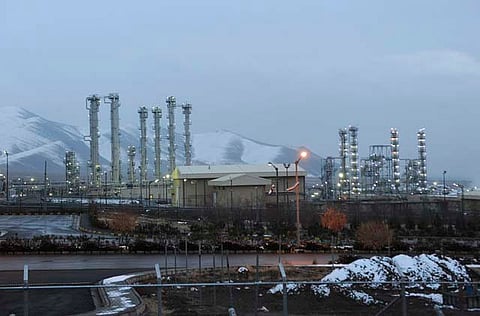Iran urged to change ‘negative behaviour’
Tehran must warm up to its neighbours, end its support to terror groups

As talks between Iran and Western powers seems to be going nowhere, especially after Tehran’s latest breach of United Nations resolutions — firing a ballistic missile into space — the Iranian regime was put on notice closer to home.
Tehran needs to change its “negative behaviour”, Saudi Arabia’s King Salman said in a year-end speech on Wednesday. The King said he hoped that Iran would abandon its hostile policies in the region and instead embrace friendly ties with its neighbours.
“We are following with great concern the policy of the Iranian regime that destabilises security and stability in the region, including the establishment and support of sectarian and armed militias, the systematic deployment of its military capabilities in the countries of the region, and its lack of cooperation with the international community regarding the nuclear programme and its development of ballistic missile programmes,” King Salman said in his annual speech to the Shura Council. He stressed that Iran’s support for the terrorist Al Houthi militias in Yemen prolongs the war and threatens the security of the kingdom.
But the King had also this message to Iran’s leaders. He said it would be in the interest of the entire region if Iran chose to “change its negative policy and behaviour in the region and shift towards dialogue and cooperation”.
Change course
Gulf states have repeatedly called on Iran to change course, to stop interfering in the affairs of its neighbours and end its support for proxy groups in a number of Arab states. But those sincere calls have fallen on deaf ears, unfortunately.
For decades now, Iran posed the most immediate threat to this region. And not just its aggressive foreign policy or the nuclear programme that worries Riyadh and the rest of the Gulf Cooperation Council. Iran has developed an advanced ballistic programme in violation of its commitment to UN resolutions.
On Thursday, Iran said it had used a satellite launch rocket to send three research devices into space. The launch failed. But the fact remains that the attempt was in clear violation of those commitments, according to the western countries that signed the 2015 nuclear deal. France, Germany and the United States all condemned the launch, which could be used to test technology for ballistic missiles, according to German officials.
Gulf states hope the ongoing Vienna talks will succeed in salvaging the nuclear deal but insist that it should include binding clauses on Iran’s ballistic missiles programme and its destabilising actions in the region.
But even if those clauses were not included, the Iranian people will benefit greatly, as King Salman pointed out, from a change in Tehran’s behaviour. By warming up to its neighbours, respecting their sovereignty and ending its support to terror groups and proxy militias, a whole new world of opportunities will open up for it.



